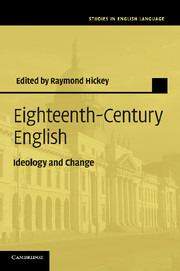Book contents
- Frontmatter
- Contents
- List of figures
- List of maps
- List of tables
- Notes on contributors
- Preface
- 1 Attitudes and concerns in eighteenth-century English
- 2 Prescriptivism and the suppression of variation
- 3 Women's grammars
- 4 Eighteenth-century women and their norms of correctness
- 5 Lowth as an icon of prescriptivism
- 6 Queeney Thrale and the teaching of English grammar
- 7 Coalitions, networks, and discourse communities in Augustan England: The Spectator and the early eighteenth-century essay
- 8 Contextualising eighteenth-century politeness: social distinction and metaphorical levelling
- 9 Expressive speech acts and politeness in eighteenth-century English
- 10 Variation and change in eighteenth-century English
- 11 Variation in sentential complements in eighteenth- and nineteenth-century English: a processing-based explanation
- 12 Nationality and standardisation in eighteenth-century Scotland
- 13 English in eighteenth-century Ireland
- 14 Changes and continuities in dialect grammar
- 15 ‘Be pleased to report expressly’: the development of a public style in Late Modern English business and official correspondence
- 16 Registering the language – dictionaries, diction and the art of elocution
- Timeline for the eighteenth century
- References
- Late modern English language studies
- Indexes
16 - Registering the language – dictionaries, diction and the art of elocution
Published online by Cambridge University Press: 06 December 2010
- Frontmatter
- Contents
- List of figures
- List of maps
- List of tables
- Notes on contributors
- Preface
- 1 Attitudes and concerns in eighteenth-century English
- 2 Prescriptivism and the suppression of variation
- 3 Women's grammars
- 4 Eighteenth-century women and their norms of correctness
- 5 Lowth as an icon of prescriptivism
- 6 Queeney Thrale and the teaching of English grammar
- 7 Coalitions, networks, and discourse communities in Augustan England: The Spectator and the early eighteenth-century essay
- 8 Contextualising eighteenth-century politeness: social distinction and metaphorical levelling
- 9 Expressive speech acts and politeness in eighteenth-century English
- 10 Variation and change in eighteenth-century English
- 11 Variation in sentential complements in eighteenth- and nineteenth-century English: a processing-based explanation
- 12 Nationality and standardisation in eighteenth-century Scotland
- 13 English in eighteenth-century Ireland
- 14 Changes and continuities in dialect grammar
- 15 ‘Be pleased to report expressly’: the development of a public style in Late Modern English business and official correspondence
- 16 Registering the language – dictionaries, diction and the art of elocution
- Timeline for the eighteenth century
- References
- Late modern English language studies
- Indexes
Summary
The eighteenth-century context
A large number of persons habitually speak of ‘the Dictionary’, just as they do of ‘the Bible’ or ‘the Psalms’; and who, if pressed as to the authorship of these works, would certainly say that ‘the Psalms’ were composed by David, and ‘the Dictionary’ by Dr Johnson' (Murray 1900: 2). As James Murray (editor of the Oxford English Dictionary (OED) 1878–1915) here indicates, it is Johnson who, at least in popular belief, towers over eighteenth-century lexicography, often being accorded the status of writer of the prototypical dictionary, as well as – mythically if erroneously – of writer of the ‘first’ dictionary. In reality, of course, the centenary of the first monolingual dictionary – Cawdrey's Table Alphabeticall (1604) – was fast approaching even as the eighteenth century began. As John Marchant moreover stressed, it was ‘the Number and Variety of English Dictionaries’ which was instead more accurately to characterise this period (1760: b1r). Against the canonical pre-eminence of Johnson (the ‘stupendous Undertaking’ praised by David Baker (1764); the ‘indefatigable industry’ by which Johnson ‘from the best authorities, corrected the mistakes, retrenched the superfluities, and supplied the defects of those who went before him’), stand therefore a whole range of other works, diversified by size and price, by audience and addressees, by contents and language attitudes, as well as by their differential positioning within a genre which was by no means either monosemic or capable of being reduced to a single representative text.
- Type
- Chapter
- Information
- Eighteenth-Century EnglishIdeology and Change, pp. 309 - 338Publisher: Cambridge University PressPrint publication year: 2010
- 1
- Cited by



